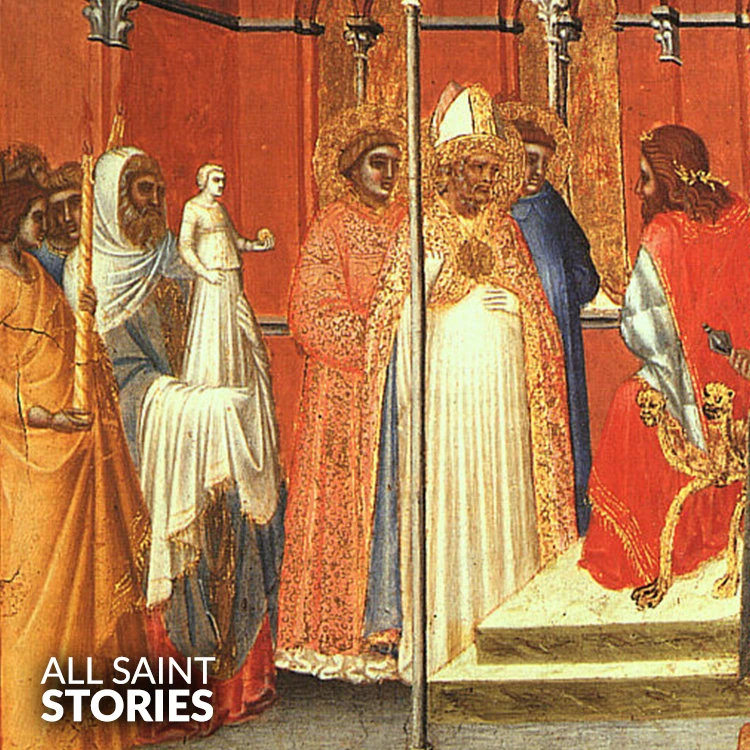"Lord God, You have blessed your Church with the witness of Saint Sabinus and his companions, who courageously proclaimed Your truth. Through their intercession, grant us the strength to remain steadfast in our faith and to follow Your will with joy and humility. May their example inspire us to live lives of holiness and service, always trusting in Your love and mercy. Through Christ our Lord. Amen."
ST. SABINUS AND COMPANIONS (MARTYR)
ST. SABINUS AND COMPANIONS (MARTYR)

St. Sabinus and his companions were early Christian martyrs who suffered persecution under the Roman Emperor Diocletian. As bishop of Spoleto, Sabinus refused to sacrifice to pagan gods and was brutally tortured along with his fellow Christians. Despite immense suffering, they remained steadfast in their faith, ultimately earning the crown of martyrdom.
St. Sabinus was a bishop in the early 4th century, during the severe persecution of Christians under Emperor Diocletian. He was known for his deep faith, charity, and commitment to spreading Christianity in Italy. However, as the Roman authorities intensified their crackdown on Christians, Sabinus and his companions were arrested for refusing to worship the pagan gods.
Brought before the Roman governor Venustian, St. Sabinus and his followers boldly proclaimed their faith. The governor ordered them to make offerings to the idols, but they refused. In response, Sabinus was tortured—his hands were crushed as an attempt to break his spirit. Despite his agony, he remained resolute in his devotion to Christ.
Seeing the faith of Sabinus, several of his captors, including the governor’s own son, were moved by his example and converted to Christianity. This enraged the authorities, who subsequently ordered the execution of Sabinus and his companions. They were put to death around the year 303, likely beheaded or executed in other brutal ways common to Christian martyrs of that time.
Even after their deaths, their faith continued to inspire believers, and their relics were venerated throughout Italy. Today, St. Sabinus and his companions are remembered as heroic witnesses to the faith, and their martyrdom stands as a powerful testimony to Christian perseverance under persecution.
Video Not Found
The information on this website is compiled from various trusted sources. While we aim for accuracy, some details may be incomplete or contain discrepancies.
If you notice any errors or have additional information about this saint, please use the form on the left to share your suggestions. Your input helps us improve and maintain reliable content for everyone.
All submissions are reviewed carefully, and your personal details will remain confidential. Thank you for contributing to the accuracy and value of this resource.
Credits & Acknowledgments
- Anudina Visudhar (Malayalam) – Life of Saints for Everyday
by Msgr. Thomas Moothedan, M.A., D.D. - Saint Companions for Each Day
by A. J. M. Mausolfe & J. K. Mausolfe - US Catholic (Faith in Real Life) – Informational articles
- Wikipedia – General reference content and images
- Anastpaul.com – Saint images and reflections
- Pravachaka Sabdam (Malayalam) – Saint-related content and insights
We sincerely thank these authors and platforms for their valuable contributions. If we have unintentionally missed any attribution, please notify us, and we will make the correction promptly.
If you have any suggestion about ST. SABINUS AND COMPANIONS (MARTYR)
Your suggestion will help improve the information about this saint. Your details will not be disclosed anywhere.
© 2026 Copyright @ www.allsaintstories.com



 English
English
 Italian
Italian
 French
French
 Spanish
Spanish
 Malayalam
Malayalam
 Russian
Russian
 Korean
Korean
 Sinhala
Sinhala
 Japanese
Japanese
 Arabic
Arabic
 Portuguese
Portuguese
 Bantu
Bantu
 Greek
Greek
 German
German
 Dutch
Dutch
 Filipino
Filipino